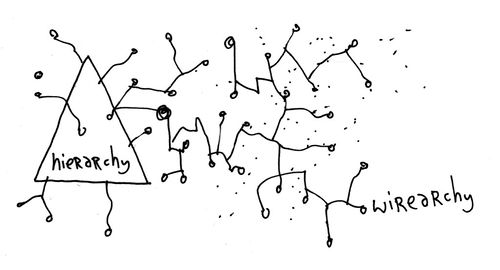Matt Weber’s description of IBM’s social media platform was fascinating. At the places where I’ve worked, we’ve had a clunky intranet directory for trying to find people. I’ve worked in very large organisations, and for the most part, it is a complete mystery to me who most people are, and what most people do! Sure, I’ve seen some colour-coded organisational charts, and have seen my box appear on some of them, but it seems very formal and rigid. The affordances of a social networking site would be far more effective for finding people.
I love the idea of a Social Networking Site for within an organisation. For me, it would make the other employees seem more human, which may seem slightly counter-intuitive given that it’s a digital space, rather than a physical space.
Traditional organisations have been structured with a head or CEO, with a small number of people who report to him or her. Then there are a number of people reporting to one of the people reporting to the CEO etc. etc., until you make your way down to several people at the bottom. In a library setting, this is usually the shelvers and the library assistants.
Here’s a kind of traditional structure:

Image from: http://1u88jj3r4db2x4txp44yqfj1.wpengine.netdna-cdn.com/wp-content/uploads/2014/03/chart.jpg
In the same talk, Nicole Ellison mentioned that it’s important to know who knows what. But she went on to say it’s becoming more important to know who knows who!
Traditionally, those at the top of the hierarchy tend to have more experience and know more (of the ‘what’ stuff). They are usually remunerated handsomely. Those on the bottom of the hierarchy tend to have less experience and to know less (of the ‘what’ stuff). They are usually on or near minimum wage.
If organisations shift to valuing more of who knows who, then perhaps these traditional hierarchies will be flattened. Perhaps this change in value, with the help of the tool of an organisational social networking site, would allow employees to meet others and work on projects that suit them the best, rather than working on projects within the bounds of their rank. If being connected to people is valued, then perhaps this would also have ramifications for how staff be remunerated. Following the recession, I’ve seen more and more highly qualified people struggling to get jobs. Sometimes they are ‘lucky’ to gain a position at the bottom of the hierarchy, despite knowing a lot of the ‘what’ stuff.
I would welcome a structural shift in libraries from being based on hierarchies to wirearchies.

Image taken from http://wirearchy.com/2013/05/09/co-creating-as-disruption-to-the-dominant-cultural-framework/wirearchy-gv-logo-normal-size-jpg/
This would allow the leveraging of social capital to help get things done! It may even help increase the value of libraries. Let’s give it a go!